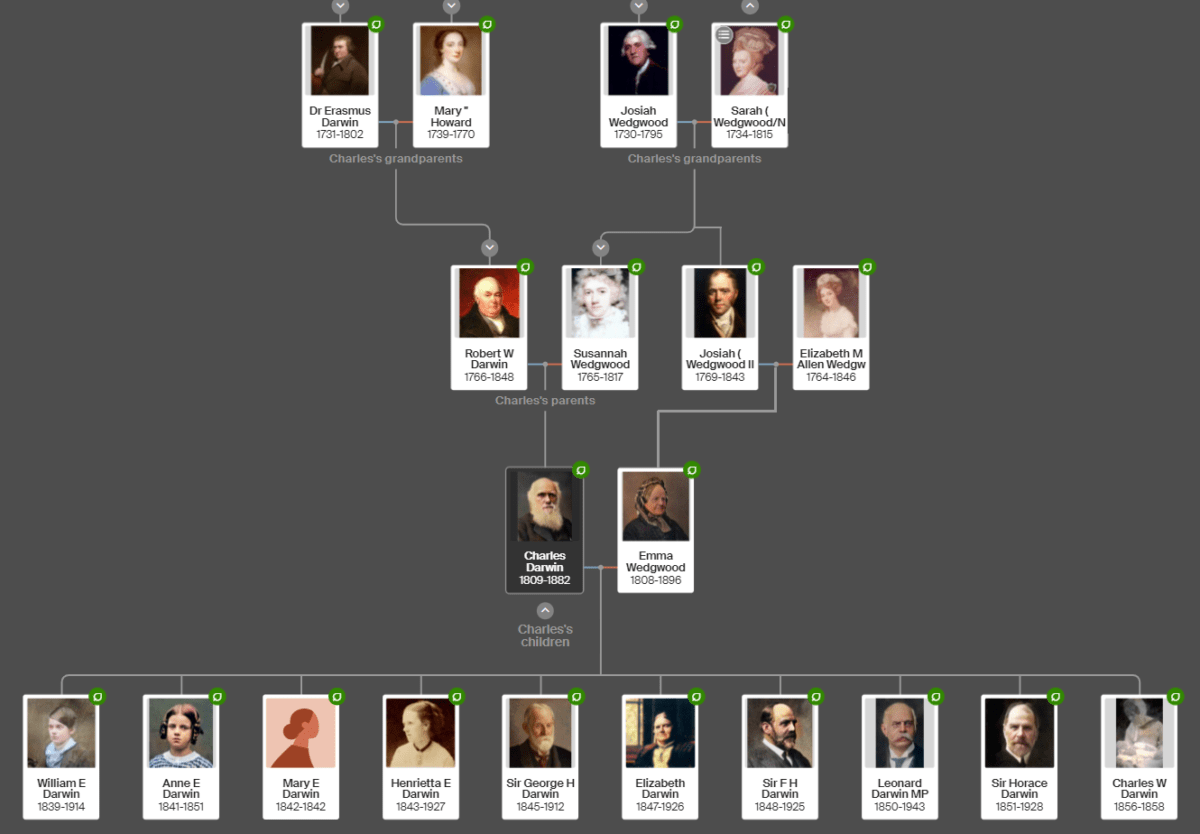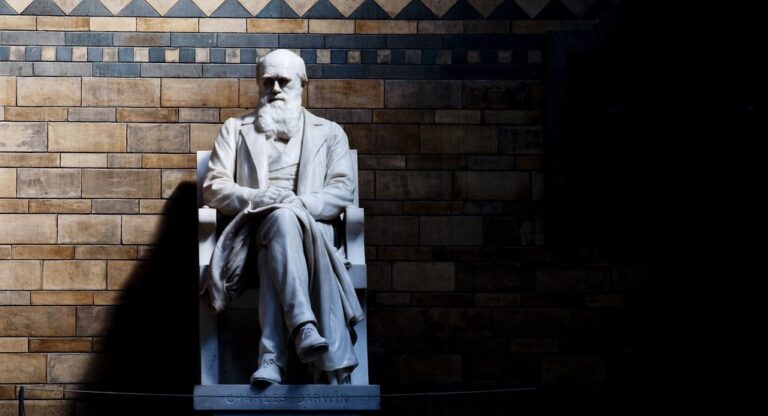Charles Darwin was a lucky man. He was well educated and privileged. He was born into a family that provided him with an environment conducive to intellectual curiosity and scientific exploration. His family and family friends are a great example of how environment can forge a person. By all accounts, he was gentle and kind of demeanor, deeply thoughtful, and dedicated to his family and work. Let’s outline the fabric of his family life, his accomplished relatives, and family friends. The following research was completed as preparation for my book, “30 Philosophers: A New Look at Timeless Ideas.” While Darwin was not an anchor for any chapter, his Theory of Evolution was so important, it is scattered throughout the book.
Family Life: Supportive, structured, and comfortable.
Charles Darwin was born on February 12, 1809, into a family that valued education and had a keen interest in scientific and medical fields. His father, Robert Darwin, was a successful physician known for his intelligence and financial acumen, ensuring the family’s prosperity and ability to support Charles’s academic and scientific pursuits.
Charles’s mother, Susannah Wedgwood Darwin, came from the prominent Wedgwood family, known for their successful pottery business. Though she passed away when Charles was only eight, her family’s entrepreneurial spirit and commitment to social reform and education left a lasting influence on him. He married his first cousin Emma Wedgewood in 1839.
Charles was the fifth of six children, growing up in a lively household where the importance of education and the natural world was emphasized. This nurturing environment, combined with the freedom to explore, laid the foundation for his enduring fascination with nature.

Family Accomplishments: A Legacy of Scientific Inquiry
The Darwin family boasted notable accomplishments, particularly in science and medicine, which undoubtedly influenced Charles’s path. While his family was religious, like most of his era, they were also curious about nature.
Robert Darwin (Father): Charles Darwin’s father, Robert, was a successful physician and financier, ensuring the family remained in a financially stable. Beyond his medical practice, Robert was deeply interested in botany, a passion he shared with Charles. His success provided the stability and resources that allowed Charles the luxury of pursuing his interests without financial burden.
Erasmus Darwin (Grandfather): His grandfather, Erasmus Darwin, was a prominent physician, poet, and philosopher who proposed his own ideas on evolution and natural selection. This intellectual environment undoubtedly influenced Charles Darwin from a young age. A man of wide-ranging interests, Erasmus Darwin was a pioneering figure in natural philosophy. He was an early proponent of ideas related to evolution and natural selection, outlined in his works like Zoonomia. Erasmus’s speculative ideas about the transformation and progression of species laid conceptual groundwork that Charles would later build upon and refine.
Josiah Wedgwood (Maternal Grandfather): Another grandfather, Josiah, was a renowned potter and entrepreneur, embodying the innovative spirit of the time. Though more known for his contributions to industry and art, Wedgwood also supported science and education. His entrepreneurial spirit and social reforms reflected a forward-thinking approach that valued innovation and knowledge, traits that resonated within the Darwin family.
Family Connections: Well-to-Do and Successful Friends.
The intellectual vibrancy of Charles Darwin’s family extended beyond its immediate members to a distinguished circle of friends and acquaintances, encompassing some of the most influential figures of the time. These connections not only reflect the family’s standing in society but also the rich intellectual milieu that contributed to Darwin’s development as a scientist.
Erasmus Darwin and the Lunar Society: Charles Darwin’s grandfather, Erasmus Darwin, was a key figure in the Lunar Society of Birmingham, a group that included industrial innovators, natural philosophers, and other luminaries of the Enlightenment. Members like Josiah Wedgwood, Erasmus’s close friend and Charles’s other grandfather, Matthew Boulton, and James Watt, the steam engine innovator, were regular participants. This society was a melting pot of ideas that undoubtedly influenced Erasmus’s own thinking on evolution and natural selection, ideas that would later find a more concrete expression in Charles’s work.
The Wedgwood Connection: The Wedgwood family, into which Charles’s mother was born, were not only renowned for their pottery but also for their intellectual pursuits and support for scientific exploration. Josiah Wedgwood, Charles’s maternal grandfather, was a fervent supporter of education and innovation, counting among his friends the likes of James Watt. This connection between the Darwin and Wedgwood families fostered an environment where scientific inquiry was highly valued.
Robert Darwin’s Influence: Charles’s father, Robert Darwin, was a respected physician whose medical practice and wise investments ensured the family’s financial security. His professional network included fellow physicians and scientists, many of whom would have been regular visitors to the Darwin household, contributing to the intellectual atmosphere that Charles grew up in.
But Not the Steam Engine
Despite the affluence and scientific curiosity of the Darwin family and their circle, they did not directly contribute to the development of the steam engine—a common misconception often mistakenly linking them to James Watt. Watt, celebrated for his significant improvements to the steam engine, was indeed a contemporary innovator whose work paralleled the scientific endeavors of the Darwin family’s acquaintances, particularly within the industrious spirit of the era. However, direct involvement or collaboration between Watt and the Darwin family on the steam engine project is not documented.
Also, while James Watt, born in 1736, did make improvements to existing steam engines, he had nothing to do with the invention of it. Thomas Newcomen, born about 1664, is frequently credited with inventing the steam engine in 1712, but his “invention” is more of a “rediscovery.” I say he “rediscovered” it because inventions are frequently “invented” or “discovered” many times before they settle into the Grand Rational Framework of common knowledge. Newcomen’s effort is better described as development of the first commercially successful steam engine. The earliest known inventor of the steam engine is credited to Hero of Alexandria in ancient Greece, born about 10 CE, give or take a few decades.

Weekly Wisdom Builder
Got 4 minutes a week?
A new 4-minute thought-provoking session lands here every Sunday at 3PM, emailed on Mondays, and shared throughout the week.
Exactly what the world needs RIGHT NOW!
Charles Darwin’s Own Connections
As he came into his own as a naturalist and scientist, Charles Darwin built relationships with leading figures of his day, including botanist Joseph Dalton Hooker, geologist Charles Lyell, and Thomas Huxley, known as “Darwin’s Bulldog” for his advocacy of Darwin’s theories. These friendships were not only personal but also professional, providing Darwin with critical feedback and support for his evolutionary theories.
The story of Alfred Russel Wallace is a fascinating and essential chapter in the history of evolutionary theory. Working in isolation, Wallace independently arrived at a theory of evolution by natural selection, remarkably similar to Darwin’s own conclusions. Unlike Darwin, who had meticulously gathered evidence and refined his ideas over many years but hesitated to publish, Wallace was more disposed to share his findings. In 1858, upon learning of Wallace’s parallel discoveries, Darwin was propelled out of his reluctance, recognizing the urgency to publish his extensive research.
In a demonstration of remarkable integrity and collegiality, Darwin did not seek to overshadow Wallace. Instead, with the encouragement and assistance of mutual scientific colleagues, including Charles Lyell and Joseph Hooker, a joint presentation of their theories was arranged. This collaborative event took place at the Linnean Society of London, marking a pivotal moment in scientific history by publicly introducing the principle of evolution by natural selection to the academic world.
The following year, in 1859, Darwin published “On the Origin of Species,” a comprehensive treatise that laid out his theory in full, supported by an abundance of evidence and detailed argumentation. While Darwin’s work became more widely known and is often credited with founding the theory of evolution, it’s important to acknowledge Wallace’s concurrent discovery and the collegial spirit in which both men advanced the scientific understanding of life’s diversity. This cooperative approach to the unveiling of their groundbreaking insights exemplifies the ethos of scientific discovery and progress.
The interplay of ideas among these interconnected families and their friends created a vibrant intellectual community that had a profound impact on Charles Darwin. The encouragement to pursue scientific interests, coupled with exposure to leading thinkers and innovators of the era, played a crucial role in shaping his approach to natural history and his eventual development of the theory of evolution by natural selection.
Surrounded by a family of thinkers, healers, and innovators, Charles Darwin’s early life was steeped in a culture of inquiry and exploration. This supportive and structured environment, combined with the accomplishments and intellectual pursuits of his family, provided a fertile ground for Darwin’s curiosity about the natural world. It was within this context that Darwin’s ideas on evolution by natural selection took root, ultimately leading to a scientific revolution that would change our understanding of life on Earth. Through the lens of his family life and heritage, we see how deeply interconnected personal history and scientific discovery can be, illustrating the profound impact of environment and lineage on the course of human knowledge.















